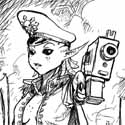|
|
|
|
|

|
| # ? Apr 24, 2024 19:03 |
|
It wasn't a very funny joke in the first place. Like the problem is you treated fluency in a fairly prolific language group like it was arcane knowledge, and then defended your patronizing ignorance by invoking the stereotype of Americans being ignorant. That comes off less as self-deprecationg and more as an abrogation of responsibility.
|
|
|
|
Falconier111 posted:
And no, there's not any discussion of safety tools or what content you should maybe strongly consider leaving out of your pseudo-Viking pretend fun times.
|
|
|
|
I should probably start posting my Mutant 2089 'review' at some point soon-ish. Mostly because I've spent all week writing a 16 update backlog covering the first half of the game. 
|
|
|
|
Warhammer Fantasy Role Playing 4th Edition Starter Set Pre-Gen Adventure Double Feature Two Wrongs Make a Right Quality: 5 Guidance: 4 Unions & Reunions Quality: 1 Guidance: 1 I have something that I think can change the conversation! Originally I was going to do Memories of Blood next, the Salundra adventure. But instead, I felt it might be more useful if I reviewed my favorite pre-gen scenario, Two Wrongs Make A Right side by side with my least favorite, Unions and Reunions. As I mentioned several times during my last post, these scenarios are only one page long. This puts a pretty hard cap on how many words you can use to set up and resolve your adventure. You've only got 800 words to work with, less if the page includes stat blocks and illustrations. You know what very easy to concisely describe? The who, what, why, where and how things go wrong in a heist. You know what is very difficult concisely describe? A chaos plot with a tinge of sexual menace and PC cannibalism that require several complicated social interactions and a deliberate effort by the players to not disrupt the plot. In Two Wrongs Make A Right, Molli's twin sister Mimi (the book writes it Mi-mi, but I've never seen that version of the name before) is in trouble. Molli is a halfling thief who started life was pauper with her 12 siblings before taking up crime and adventuring. Anyway, General von Daberknick's signet ring has been stolen, prompting a city-wide lockdown. Mimi has the ring after she pick-pocketed the actual thief, and desperately needs help sneaking into Black Rock to make it seem like the ring was lost and not stolen. Who, what, why, where. As for how things go wrong, the actual thief was a Slaaneshi Chaos Sorcerer who needs the ring as part of a ritual to possess von Dabernick. The sorcerer, Edmund Streissen, is being pursued by a Grey Wizard known as Maggie Blanck, disguised as a servant of von Dabernick. That's right, your heist has stumbled into a secret war between a Chaos Sorcerer and an undercover agent of the Wizardry Intelligence Agency. Assuming the players don't align themselves with the evil sorcerer, Blanck will likely be an ally who can help them escape after they return the ring. It's a fun adventure, it's concise, it makes excellent use of what Ubersreik and the Empire offers as part of a setting. It's a tad generic in that anyone with old thief buddy could be Mimi's connection to the group, but that just means it's easy to adapt. It's my favorite for a reason. So let's turn our attention to Unions and Reunions, the adventure for Amris Emberfell. Amris is a High Elf Merchant who abandoned his boring job to tag along with a bunch of adventurers. As I mentioned before, his characterization is going to heavily depend on the secrets that the player picks - he could be trust fund kid who thinks Wood Elves are neat, he might have been 'kidnapped' by the unwitting party, he might be an agent spying on the Empire for his High Elf patrons, or all three. I want to heavily emphasis this - there is no guarantee that the player picked the "Thinks Wood Elves are Really Cool" or "Made his father think he was kidnapped" secrets. They might decide to play him as an unassuming merchant who actually writes detailed reports to his superior in the Elf CIA. The adventure starts with the party being hired to investigate beastmen attacks and recover the prisoners they took. These attacks are unusual, as they Beastmen strike in lightning-fast and well-organized raids, lack the typical brutality, and disease always follows in the wake of the attacks. If they investigate further, the players will notice that the arrows used are primitive but very well-crafted. So, basically, your players are going to know that these aren't actually beastmen attacks, even if they play along in character. But let's stop there to focus on Illyrius Starsight, a powerful High Elf Mage hired by Amris' father to escort him home. What if Amris didn't take the appropriate secrets to justify these behavior, and instead is secretly a ruthless spy? Doesn't matter, Illyrius has magically linked himself to Amris so he can track him anywhere, and is insistent that Amris return. He gives Amris a week to resolve his commitments and help the party wrap up the adventure. But let's stop there to focus on Ulliamar Skytear, a Wood Elf Spellsinger. She claims that her camp was attacked by Beastmen who kidnapped one of he kinband, but she noticed Amris and the magical link that Illyrius made with him. She invites the party to join them, where they're fed "curiously spiced meats." So, yeah, the adventure just nonchalantly tricks the players into cannibalism, something that is going to become pretty apparent to the players when the GM starts describing the suspiciously friendly Wood Elves feeding them suspicious meat after suspiciously claiming to be attacked by Beastmen that the players will suspect don't actually exist. When they investigate the camp, the other PCs besides Amris will find well-crafted arrows, potions of death and decay, and a clearing filled with human bones. But let's stop there to focus on Amris and ceremonial marriage to Ulliamar. To explain, Ulliamar will claim she can sever the link that Illyrius made by forming a new link with Amris. It just requires a ceremonial and non-binding marriage ritual between Amris and Ulliamar. A ritual that is Elves only, so Amris has to go alone while the rest of the party is left behind to investigate the Wood Elf camp and find the human bones. What if Amris didn't take the "Wood Elves are cool!" secret, or isn't comfortable with a 'non-binding' marriage ceremony with strangers, or if the party is suspicious that the Wood Elves are behind the attacks, or if they just follow the old adage about never splitting the party? Well, uh, I guess the rest of the adventure doesn't happen. But let's say everyone plays along. Surprising no one, it turns out the Wood Elves are Chaos Worshipers of Nurgle. The ritual is actually a re-enactment of the mythical marriage of Nurgle to his stolen bride, the Elven Goddess Isha - Amris playing the part of Nurgle, Ulliamar playing the part of Isha. About the only good thing I can say this adventure is that I like the idea that Elves have myths involving both their Gods and the Chaos Gods, even if it uh... doesn't really fit the setting as I understand it. Anyway, Amris takes 1d10 Corruption points (likely enough to cause him to mutate) and falls unconscious while Ulliamar gives birth to a swollen, malformed deamon elf child extrudes filth and disease. To be fair to the adventure, the ritual isn't detailed and Amris is unconscious while the birthing occurs, which is why I described the adventure as only having a tinge of sexual menace. Anyway, Amris wakes up just after the Wood Elves leave to let the deamon child eat him and the rest of the party shows up to save him. The Daemon Child is extremely tough between having a TB 6 and 25 Wounds, causing Fear, and completely ignoring 30% of all non-magical attacks due to the Daemonic(+8) trait. It's still a single big enemy, so the party should be able take care of it. ANYWAY, Illyrius arrives after the party manages to kill the daemon, having sensed its foul presence. He's impressed that Amris is capable of slaying a daemon and that claims that Amris has proven himself through his wise decision making. I'm pretty sure if I used that line on my group, they'd either burst out laughing at this loving pretentious idiot or think that Illyrius was mocking them. Anyway, that's how the adventure ends. All of this is described on one page, with a statblock and two pictures. It has no room to develop any of the ideas or hooks, requires your players to play along by making a series of bad decisions, and unfairly punishes them if they do. It provides absolutely no support if the party decides to do anything else, like fight Illyrius or the Wood Elves, or refuse to do the ritual, or pretend to play along while someone sneaks off to look for the prisoners that these Wood Elves obviously took. It's just straight garbage, and unfortunately the rest of the adventures are closer to Unions and Reunions than Two Wrongs Make A Right. None of them are as uniquely bad as Unions and Reunions, but they generally fail to develop their ideas sufficiently in the space allotted. Next Time: Generic and Incoherent, for real this time
|
|
|
|
I thought the Isha thing was a 40k thing, not Fantasy?
|
|
|
|
Night10194 posted:I thought the Isha thing was a 40k thing, not Fantasy? But I guess the Chaos Wood Elves - kinda weird there, but fits into the setting well enough I guess - believe that Isha was/is a captured bride of Nurgle. I assume the High Elves don't agree?
|
|
|
|
In "mainstream" Wood Elf myth in Warhammer fantasy, Isha is the wife of Kurnous, Lord of Beasts. The Wood Elves are ruled by Orion, the mortal avatar of Kurnous, who dies every year, and his wife, the Mage Queen Ariel, who's the mortal avatar of Isha, who, every winter, takes Orion's ashes and seals herself and them in this sacred oak every winter, and every spring, they return alive. So it sounds like these Nurgleite Wood Elves are doing some sort of blasphemous parody of the traditional wood elf beliefs?
|
|
|
|
My understanding was that the Elven pantheon got ported wholesale into 40k and then killed of by the Chaos gods in the backstory. Wouldnít surprise me to find some stragglers in 40k.
|
|
|
|
That entire adventure is terrible as hell, BTW. Like just the worst.
|
|
|
|
Epicurius posted:So it sounds like these Nurgleite Wood Elves are doing some sort of blasphemous parody of the traditional wood elf beliefs? That's my read on it. Chaos wood elves coming up with a Chaos-dominated spin on traditional elf religion.
|
|
|
|
I really can't emphasize enough how much I hate the idea of rolling a 1d10 to determine how many Corruption Points your Amris player takes. To give context within the system, a character risks mutation if they take their TB + WPB in Corruption Points. Amris has an impressive 43 WP and average 28 T, so he can take 6 Corruption Points before he risks mutation. If he took the "Actually a Secret High Elf Bigot" secret, he's got 3 less points of wiggle room. So based on a single roll, your player is looking at a 50% to 70% that he's facing a Mutation... or he rolls a 1 and he's perfectly fine. It's way too swingy. Your Amris player gets a chance to roll Endurance and resist mutating, but he's only got a 28 T. He's pretty likely to mutate if it comes to that. High Elves have only one point of Resilience, and burning Resilience doesn't reduce your corruption like a mutation does, so it's very unlikely that your Amris player will choose to ignore the mutation. The only benefit is that High Elves only suffer from mental mutations, which are mostly just penalties to mental characteristics but don't immediately doom your character like a new tentacle would. Still, you're looking at an extremely random result that mean on one hand your player has a character that's fine if somewhat worried about coming in contact with corruption, or on the other is... let's roll some dice here... "Totally Unhinged", taking a -20 to Fellowship and +10 to Willpower. I also take a bit of offense at the adventure offering a problem, and then offering a solution, but significantly punishing the player for taking the solution. I'm not talking about the consequences of being married to an evil Nurgle worshipping Wood Elf - that's just some good fun drama. But if every time your Merchant character rolls Haggle they're taking a -20 penalty to their Haggle because they come off like a nutter? That's how you get groups who never do anything fun and refuse to take any risks.
|
|
|
|
Corruption in general feels like a poor implementation of something WHFRP kind of needed: Making mutation and stuff no longer binary save-or-dies. But then as you say you get stuff like a d10 Corruption and dang, that sure is effectively similar to a save or get hosed.
|
|
|
|
Why should mutations be negative, anyway? They're literally the Dark Gods tempting you with their unholy power, make them all beneficial stuff.
|
|
|
|
Because they're also the Dark Gods trying to tell you 'come to us, we're the only ones who can treat this pain and sickness or shield you.' E: At the same time, with that, they should likely be able to turn around positive if you do what the Gods want. Except the Chaos Gods are also stupid dicks who love ruining and hurting their followers at random, so... Night10194 fucked around with this message at 22:57 on May 30, 2020 |
|
|
|
Night10194 posted:Corruption in general feels like a poor implementation of something WHFRP kind of needed: Making mutation and stuff no longer binary save-or-dies. But then as you say you get stuff like a d10 Corruption and dang, that sure is effectively similar to a save or get hosed. Otherwise, I actually really like the Corruption system. Like a lot of the system, exposing yourself to corrupting situations feels dangerous but usually isn't in the immediate sense. You're usually only taking 1, maybe 2 points at a time even in the worst case "Making a deal with a Daemon" Major Exposures, so you've got lots of room to realize you're in danger before something happens to your character. Besides that, you're only dealing with Dark Bargains for rerolls, which I think are generally a pretty good deal when you need a reroll outside of a Chaos-centric game.
|
|
|
|
It's normally a max of three per time? drat, putting a d10 in there is completely nuts, then.
|
|
|
|
Epicurius posted:In "mainstream" Wood Elf myth in Warhammer fantasy, Isha is the wife of Kurnous, Lord of Beasts. The Wood Elves are ruled by Orion, the mortal avatar of Kurnous, who dies every year, and his wife, the Mage Queen Ariel, who's the mortal avatar of Isha, who, every winter, takes Orion's ashes and seals herself and them in this sacred oak every winter, and every spring, they return alive. So, basically a WHFRPG Wood Elf version of old-style movie Satanists with their own version of upside-down crosses and piss for "holy water?" Those elves should die for sheer unoriginality, much less cannibalism and the mutant baby thing. Speaking of that, I admit to being mildly interested in Ulliamar Skytear (and drat is that not a Wood Elfy name or what?) and her apparent willingness/eagerness to use her own womb/vagina to bear the mutant-demon baby. Is this a thing she's done before? If not, how did she know the loving thing wouldn't eat its way out of her or something. This just doesn't seem like something that any sentient female would willingly choose to do.
|
|
|
|
Tibalt posted:
Surprised me I thought they were regular rear end in a top hat wood elves.
|
|
|
|
Given that Elves don't get physical mutations, only mental ones, how is an outside observer to tell?
|
|
|
|
Time for a new banner.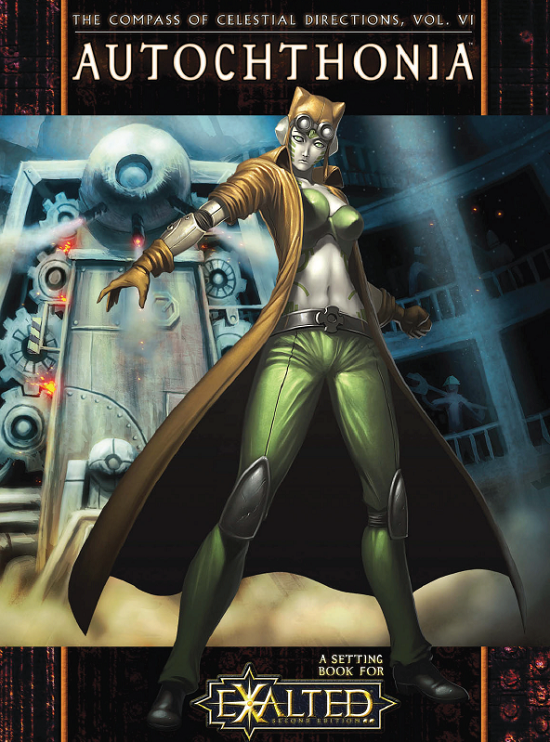 if youíre reading this in the archives you should probably hit the Alchemicals review first, this is a direct continuation. The book starts out with a table of contents and sentence-long descriptions of each chapter. The description for the first chapter references the ďuncanny natureĒ of Autochthoniaís inhabitants. Thatís not a very nice thing to say. First intro comic. An Adjudicator calls a 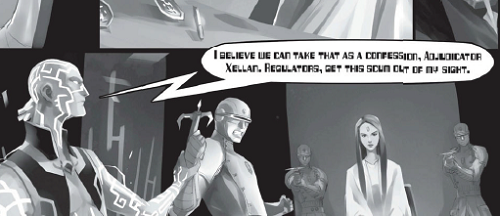 This first chapter is a grab bag that presents a bunch of tangentially related setting info. Autochthonia is a sphere big enough to fit all of Creation suspended in a pocket dimension. However, the vast majority of its population, which is much smaller, lives in the Pole of Metal at its center. The eight nations that live there, collectively called the Octet, live on organ-continents that drift back and forth; whenever two close in on each other, their borders spontaneously develop tram lines that connect them until they drift apart again. Any international travel not involving tram lines falls just short of suicide; once you get out of the settled areas you run into a cross between an abandoned factory and a case, much of which has (OSHA-noncompliant) means of traversal, but between shifting geography and the occasional industrial deathtrap or lightning arc travelers have to remain on their guard or die horribly. Between the constant industrial processes going on in the background and in the cities, Autochthonia is never silent, and its inhabitants find silence eerie and intimidating. Autochthonians divide their day in 25 hours, subdivided into five shifts named after Creation elements; most have two work shifts on and three off, though Lumpen and important workers pull three. Its inhabitants draw their souls from something called the Radiant Amphora of Celestial Accumulation, usually called the Ewer of Souls. I call it the soul reservoir because thatís easier. Upon birth each infantís soul is examined by the Luminors and evaluated based on records of the soulís previous achievements; depending on what they find they attach a soulgem of the specific type and cut assigned to their caste to their forehead, locking them into that caste for the rest of their life. Once they die, that soul is extracted from the gem and sent back to the soul reservoir until it reincarnates elsewhere, after which itís reevaluated and assigned a new caste (or possibly the same one) depending on what happened last time. Trouble is, thereís only a limited number of souls available; Autochthon only took so many souls with them, Autochthoniaís population has been steadily rising throughout history, and Autochthon, who didnít understand the nature of a soul, set up the reservoir to fuel itself by occasionally eating part of a soul that it canít regenerate.at this point the number of souls in use and available have evened out. Every child born without a soul dies immediately, meaning the Octet is building up to a population crunch as stillbirths climb. Autochthonian cultures have five formal castes and two informal ones. At the bottom of the heap lives the slaves, extreme criminals (murderers, serial rapists, heretics) who had their soulgems removed as punishment. Slaves are only barely aware of their surroundings; they canít speak and follow orders without second thought, and between their lack of self-preservation instincts and the way they get used for the most dangerous tasks means few last longer than a few years. Above them are the Lumpen, petty criminals designated for punishment; most of them come from the Populat and get demoted for stuff like repeated minor infractions, light heresy, or letting addiction get in the way of their duties, but Tripartite members can join them if they gently caress up spectacularly. Lumpen lose the right to participate in any public gatherings or activities, own no private possessions, and do unpleasant, repetitive work (though rarely dangerous stuff, that either goes to slaves or well-equipped specialists). As much as everyone beats up on them, Lumpen perform important tasks and screwing with them on the job tends to earn the ironic punishment of Lumpen status, but the authorities donít care what happens to them as long as it doesnít get out of hand. They tend to get beat in alleyways a lot. After death, their soul returns to the reservoir, after which it gets assigned a caste as normal (though it probably wonít hit Tripartite). Maybe 90% of Autochthoniaís population belong to the Populat, the vast mass of laborers that push society along. Most of their labor goes towards industrialized prayer and keeping the environment around them healthy (by Autochthonian standards), but a substantial minority makes basically every product the Sodalities donít claim control over, from simple tools to entire houses. The Populat are also divided into sub-units, but unlike as with the castes class mobility is the order of the day and competence usually gets rewarded by promotion. Most Populat are laborers, who do all the, well, labor; they range from grunt workers to trained specialists and safety inspectors. Laborers are assisted by aides, those who would otherwise be laborers except for health conditions, age, or being pregnant; they act as janitors, clerks, messengers, and even manage child rearing in communal crŤches. Laborers and aides are socially equal, especially since members of the former usually end up staffing the latter, but able-bodied aides tend to face a lot of awkward questions. Well-suited workers get promoted to shift chiefs that manage several dozen workers every shift, able shift chiefs get promoted to foremen who manage an entire factory or specific service for an area, accomplished foreman get promoted to supervisors who oversee an entire industry or group of industries (most cities have around eight), and particularly successful supervisors get promoted to directors. Each city has one director, who manages the entire cityís Populat for three shifts a day in exchange for living like a Tripartite member, and an assistant director, who manages the off shifts. At least one week a year (usually several) the director gets vacation time Ė in other words, he changes to two shifts a day and the assistant director takes the other one over Ė during which troublemakers tend to crawl out of the woodwork due to perceived weakness. The life of a Populat member is a difficult one, but it isnít unbearable. I didnít find info on the structure of an ordinary Populatís day in this chapter and Iíll update this part of the review when I find it later (no index for me to check), but if I remember right the ordinary worker has one shift on, one shift off, one shift on, and two shifts off, with some time off allowed for sickness, the rare holiday entirely off, and the occasional middle shift on in times of need. Either way, the Populat live in densely packed dorms with token concessions to privacy and most own at most a small box worth of personal goods, though they have all their material needs provided for, from food to clothing (business casual except with rank markers) to medicine. Shifts work, eat, and sleep together (not like that, usually), and most social relationships are formed between members of the same shift. In their time off they play competitive sports with members of their shift against others or do art together (they form poetry clubs, play-reading groups, drum circles, etc.); they also attend plays put on by Lectors and religious services, or just spend time with friends. Music is heavily associated with work songs and prayer sessions and plays tend towards religious themes, but poetry seems to be treated very personally. Long-term relationships and marriage arenít really a thing in most of the Octet, since work reassignments happen often enough that relationships can be broken up at any time; romance is huge in Autochthonian culture, but they idolize whirlwind romances followed by tragic partings (an omnipresent theme in their art) and consider long-lasting bonds a bit strange. Sex outside of wedlock isnít stigmatized because, obviously, there is no wedlock, and queer and polyamorous relationships carry no stigma (though apparently the last is unlucky, it doesnít say why). Instead of being raised in family units, then, children are raised by specialist aides in combination nursery-schools. Some nations encourage parents to play a role in their kidís childhood, but most donít. Obviously, religion plays a huge role in everyoneís lives with a more utilitarian and direct emphasis than most religions; they fuel Autochthonís functions with their prayers and they know it. They view the whole world as a hierarchical structure, ranging from the Great Maker down to the lowest Lumpen, and their religion holds the concept together. When it breaks down heresy and Voidbringer cults tend to creep in. 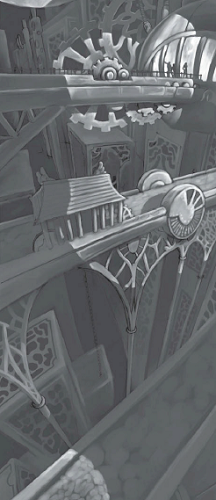 The rest of the population is divided between the three parts of the Tripartite, each of which has its own logic, structure, and set of tasks. Each city has its own Tripartite Assembly consisting of the city Autocrat (head of the Oglotary, one vote), Celebrant (head of the Theomachracy, one vote), and Sodality Council (the heads of all five Sodalities, have to share a vote), which vote on policy issues; each nation also has a National Tripartite Assembly which uses the same methods cities used to elevate leaders on a larger scale and likewise vote on national issues. The word ďvoteĒ has already lost meaning and Iím not even done with it. The Olgotary is the formal government of every community, running the bureaucracy and setting internal policy in every field the other two organizations donít control. I think the author was probably American because it closely resembles the American three-branch system. The Oglotary has four subsections:
The Theomachracy exists to bridge the gap between humans and the spirits around them as well as keeping the community from losing its focus, whatever that happens to mean. They are likewise divided into four branches:
The Five Magnificent Sodalities of Penultimate Truth and Intrastringent Gospel; drat, what a name. The cultural descendants of those technicians Autochthon taught how to make Alchemicals, who founded guilds that were later subsumed into the Autochthonian caste system. I said they functioned like medieval guilds and I meant it; they hold their knowledge close, compete with each other for influence, and police their own, dealing out rather gruesome punishments as they see necessary. The other parts of the Tripartite kind of let them do their own thing since theyíve given up on forcing them to work with other parts of the government outside the Assembly and the places their technical abilities are needed. They all dress like Populat members but wear decorations in their team color. Must be awkward during Assemblies when the two most important people in the room are the only ones stark naked. Each Sodality is connected with a color and magical metal (corresponding with an Alchemical caste) and sense they punish members by stripping away (because the Sodalities are the kind of organization that can be classified by how they mutilate members that step out of line).
Info on the life of Tripartite members is thin on the ground compared to that for the Populat. They usually donít live alone, but instead of dormitories with a few dozen neighbors they share the room with one or two roommates for low-ranking ones. They can eat their own secluded dining halls alone or with a few friends, work in small groups, and own luxury or bulky goods; all their privileges scale with their rank, until Autocrats and Celebrants get their own palaces with personal staffs. In a given city each branch has its own assigned lector (presumably with a substantial budget) and its members sometimes have enough pull to form permanent romantic relationships and prevent their partners being moved elsewhere. Sodalts tend to only associate with other members of their Sodality, but the other two branches seem a little looser in who they befriend and talk to. 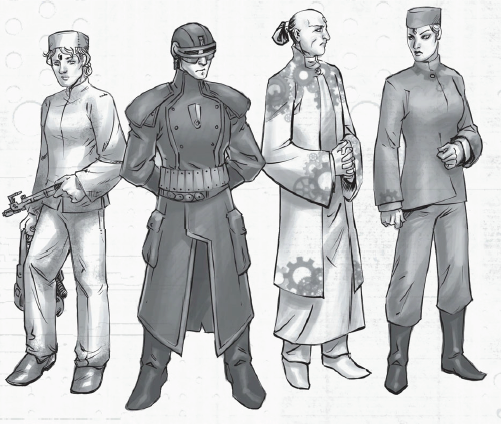 A few people live outside of the cities in shantytowns or mobile camps; Octet Autochthonians call them tunnel folk or tunnel outcasts and tend to see all of them as desperate, starving nomads, criminals outcast or escaped from justice killing and eating travelers before dying after a few years of terrified whimpering in the dark. A few are like that, yeah, and they can and do use travelers as a handy food source, but most live in communes, small settlements with at most a few hundred people crouching near a food and water source. People here focus far more on the individual then any Octet city; they raise families, follow charismatic leaders, and own (tiny amounts of) individual property in their own right instead of by the sufferance of the local government. On the other hand, they lack the infrastructure or technical knowledge to maintain a standard of living anything like you can find in a city, tend to fall under the control of particularly brutal leaders, and face turf wars with spirits, other tunnel communes, or even Octet explorers or Voidbringer cults. The Octet and tunnel folk both value and hate each other; Octet explorers like using them as guides in exchange for cheap trinkets but hate them on ideological grounds, while tunnel folk desperately want Octet goods but hate their arrogance and power and cruelty and having all this stuff we want. Communes within reach of the Octet tend not to last long before the Regulators decide the settlement is too big or too aggressive or just inconvenient to have around and they burn it to the ground. Donít worry, though, they only slaughter the adults; they take the children back home and reeducate them! Finally, we have Voidbringers. Autochthonians think of things in terms of hierarchies, so they assume they all belong to a single Voidbringer Sect, which you know is wrong if youíve been keeping up with the Alchemicals review. Cults not only threaten the lives of Octet citizens but their societyís underpinnings; if groups are capable of challenging a central authority without a central authority of their own, then a centralized authority isnít necessary to hold society together - and if thatís true, it means the social fabric that holds the Tripartite-Populat system together might unravel, breaking the flow of prayers as societies breakdown and eventually killing Autochthon. As things develops and the facts of the Void situation become clearer, that fabric will start to unravel anyway, and already the people who fight it have realized Voidbringers come in four very different flavors (each of which have their own story hooks!).
One final note: once the Seal breaks, people in Autochthonia will immediately start Exalting. Autochthonians are used to Exalts that are born strong and fall due to personal failings instead of weakness; almost every other Exaltation arises from a moment of failure, whether itís losing hope or losing your life. Autochthonia demands success and regards failure as a threat to existence. As such, Exaltation is a lot more likely to hit in the Far Reaches or on the battlefield or among people of all kinds trapped in lowly positions by Autochthonian society, leaving people potentially more powerful than even the Alchemicals scattered among populations that arenít supposed to raise in status until after they die. They donít even have the context to understand whatís happening, let alone control it; it would take some extreme digging even to isolate Estasiaís connection to the Solars, let alone gather info on any other type. Itís entirely possible Autochthoniaís salvation may be built by Exalted who are not Alchemicals. But whatever happens, itís another massive variable thrown into an already unstable equation. 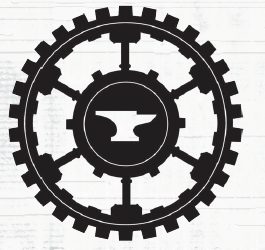 My impression? No wonder nationalism is so popular. People like to hitch their identities on things that both make them unique from most others and tie them to a few; families, religions or religious subgroups, political groups, and even sports teams can serve as building blocks for the complex hybrid identities most people gradually assemble. But there are no families in Autochthonia, only one religion without room for personalized beliefs, exactly one political ideology, and no team sports outside of temporary teams broken up whenever the situation demands. Even most personal relationships dissolve whenever someone gets transferred. Nationalismís practically the only thing people can cling to, and most people wonít meet anyone from outside the nation to define themselves against. Itís a situation tailor-made to break down a personís individuality and sanity. For all its virtues Ė and they do exist Ė Autochthonian society is a ticking time bomb waiting for some ideology to sweep through or form among the disenfranchised and explode in the faces of every Tripartite member. I probably would write more but this bastardís already broken 4300 words and Iím a bit tuckered out. Also, I would have included more art but thatís literally everything in the chapter. Next time will cover the two dominant nations in Autochthonia, Yugash and Clamat. E: forgot to do this last time; if anyone wants to bring up interesting Autochthonian items or artifacts, now is the time! Falconier111 fucked around with this message at 04:58 on May 31, 2020 |
|
|
|
Everyone posted:Did you have fun getting your self-righteousness on? Good for youuuu. Uh okay. Thanks for the red-text. Maybe just take a class in French or Mandarin and stop being weird?
|
|
|
|
This derail sucks, please stop participating in it.
|
|
|
|
Falconier111 posted:Music is heavily associated with work songs and prayer sessions and plays tend towards religious themes, but poetry seems to be treated very personally. I can't be the only person who thought of this, right: https://www.youtube.com/watch?v=GUsu1R3bOvY&t=3096s
|
|
|
|
Josef bugman posted:I can't be the only person who thought of this, right: Nope. God, I love any excuse to put that in stuff. I had it as a Drow work song dating to when they were building the Vermissian in Spire, too.
|
|
|
|
Oh god, I only took a glance at the thumbnail to confirm my suspicions now I can already hear the melody in my head.
|
|
|
|
It is such a good song.Night10194 posted:Nope. God, I love any excuse to put that in stuff. I had it as a Drow work song dating to when they were building the Vermissian in Spire, too. I am afraid I may have to steal this.
|
|
|
|
Night, you committed one of the classic blunders of talking about dwarves: you got ancestors and descendents mixed up. This is also one of my biggest pet peeves
|
|
|
|
That does seem like something I would do. E: Also, consider the Pathfinder project completed/abandoned; on looking at my notes I don't really think there's more to say about it.
|
|
|
Speleothing posted:Night, you committed one of the classic blunders of talking about dwarves: you got ancestors and descendents mixed up. 
|
|
|
|
|
I think it was one of the best things I did to get into character as my slayer is to just keep a written account of all the grudges.
|
|
|
|
Can anyone here do a quick rundown on the nature of souls and ghosts in Exalted? I haven't been able to wrap my head around the subject and the next part of the review heavily involves them.
|
|
|
|
E: nm
|
|
|
|
Falconier111 posted:Can anyone here do a quick rundown on the nature of souls and ghosts in Exalted? I haven't been able to wrap my head around the subject and the next part of the review heavily involves them. People can go into more detail than I can, but basically, souls are "us". They're the fundamental things that give personality, intelligence, creativity, and so on. Things like the Primordials/Yozi have a bunch of souls, but people only have one. So, the Yozi Malfeas, the Demon City, for instance, has as souls Ligier the Green Sun, She-Who Stands-in Doorways, the Manse of Echos Ascending, the Street of Golden Lanterns, the Creeping Oracle, and so on. They're all unique, but they're all part of Malfeas. When we die, our souls reincarnate into new bodies. However, because of the Primordial war and the Neverborn, the normal process is corrupted, and it's possible for a soul to get too attached to something in its old life and not reincarnate. These souls become ghosts.
|
|
|
|
Epicurius posted:People can go into more detail than I can, but basically, souls are "us". They're the fundamental things that give personality, intelligence, creativity, and so on. Things like the Primordials/Yozi have a bunch of souls, but people only have one. So, the Yozi Malfeas, the Demon City, for instance, has as souls Ligier the Green Sun, She-Who Stands-in Doorways, the Manse of Echos Ascending, the Street of Golden Lanterns, the Creeping Oracle, and so on. They're all unique, but they're all part of Malfeas. Some beings having multiple souls off doing poo poo also ends up with stuff like one of the souls being regarded as a simpleton dancer or whatever and then the main entity being very embarrassed about this because he likes to project an image of being a No Nonsense Mondo Macho Man but there's this side of him just out there for everyone to see and interact with that's Dipshit McJazzHands
|
|
|
|
I think Falconier meant the higher and lower souls. Everybody has a lower soul, the Po, which is basically your id and resides in your body and also the higher soul, the Hun, which is your intellect and what most people think of as 'themselves'. When you die your hun goes on to get reincarnated or goes to the Underworld if you stay behind as a ghost. Being a ghost sucks for a lot of reason, but I'll move past that for now. Meanwhile, your Po stays in your body and, if not properly placated with funeral rites might go on a murderous rampage at night (they are 'destroyed' by sunlight). Funerals and honoring the dead are a big deal in Creation because you want to placate and honor both souls. Old battlefields and massacre sites are often haunted by hungry ghosts, i.e. Po souls that haven't been treated properly and now hunger for human flesh. edit: I don't want to start poo poo, but Epicurius is wrong when he says people only have one soul. People have two. edit2: oh yeah, I forgot to mention, in Creation the devastation left behind by the mass deaths at the end of the Shogunate means there are still an absolute poo poo load of hungry ghosts infesting some cities in Creation. Chiaroscuro in particular has a huge problem with them and has to have entire districts walled off by lines of salt because hungry ghosts cannot cross a line of unbroken salt. Ithle01 fucked around with this message at 20:16 on May 31, 2020 |
|
|
|
Also, in the context of Exalted 2nd Edition, animals only have po souls; also also, the Exaltation seems to root itself in the po, rather than the hun as might be expected and the hungry ghost left behind by a dead Exalt can be massively bloated with power. Earlier editions of Exalted had Autochthon eating hun souls; in Compass: Autochthonia, this was changed to him eating po souls, mostly because the developer figured the readers would recoil from treating Autochthonian reverence for their patron seriously if he's just regularly eating the part of the souls of his followers that the readers are likely to identify with. I don't particularly agree with that creative decision -- I always found it more "interesting" than "repulsive" that Autochthon has to eat the souls of his followers to survive but is otherwise relatively non-hostile -- but enh. (Hi, I edited/proofread Compass: Autochthonia, so if you spot typos they're my fault.)
|
|
|
|
It also means that you can bring the same person back as two distinct ghosts simultaneously.
|
|
|
|
"Heroic ghost eternally hunting a monster through the afterlife and the pair of them are the hun and po soul of some past great hero" is a popular trick.
|
|
|
|

|
| # ? Apr 24, 2024 19:03 |
|
The problem with the Ewer of Souls, btw, is that it eats the po soul and, due to this misjudgment, canít recycle the hun soul. This isnít a problem in Creation even though the po remains in the body, because in Creation po souls are produced anew with each reincarnation, and as the population grows more hun souls can be created as well.
|
|
|







